Analysis of Director's Duties and Corporate Governance Report
VerifiedAdded on 2023/06/09
|12
|2822
|358
Report
AI Summary
This report, prepared for the Australian Institute of Company Directors, critically analyzes directors' responsibilities concerning shareholder and stakeholder interests, referencing the Corporations Act 2001 (Cth). It defines a director, outlines appointment laws and duties (Sections 180-184), and examines indirect inferences from various sources to evaluate the director's role in modern Australian corporations. The report highlights case laws to emphasize the director's critical role and includes recommendations for directors. The report concludes that directors must consider stakeholder interests alongside transparent business practices, financial reporting requirements, and a healthy corporate governance approach. The report covers directors’ duties, case laws, and various indirect inferences related to stakeholder responsibility. It also includes recommendations for directors and emphasizes the importance of considering stakeholder interests in light of transparent business practices and financial reporting requirements. The report underscores the significance of corporate governance in the Australian context, acknowledging the impact of corporate activities on non-shareholder groups, and emphasizes the increasing use of terms like corporate citizenship.

27 July 2018
Corporate Governance
Corporate Governance
Paraphrase This Document
Need a fresh take? Get an instant paraphrase of this document with our AI Paraphraser
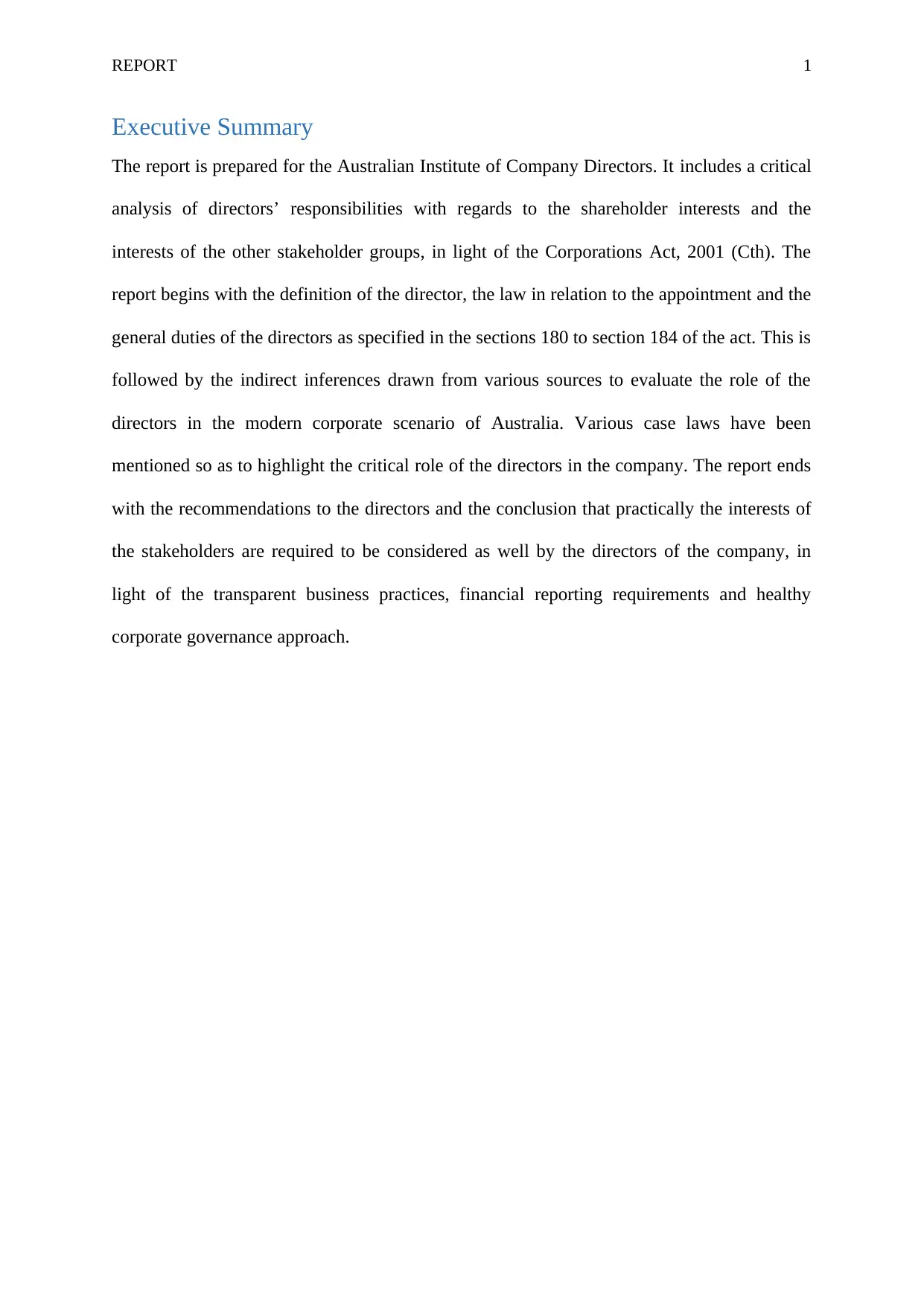
REPORT 1
Executive Summary
The report is prepared for the Australian Institute of Company Directors. It includes a critical
analysis of directors’ responsibilities with regards to the shareholder interests and the
interests of the other stakeholder groups, in light of the Corporations Act, 2001 (Cth). The
report begins with the definition of the director, the law in relation to the appointment and the
general duties of the directors as specified in the sections 180 to section 184 of the act. This is
followed by the indirect inferences drawn from various sources to evaluate the role of the
directors in the modern corporate scenario of Australia. Various case laws have been
mentioned so as to highlight the critical role of the directors in the company. The report ends
with the recommendations to the directors and the conclusion that practically the interests of
the stakeholders are required to be considered as well by the directors of the company, in
light of the transparent business practices, financial reporting requirements and healthy
corporate governance approach.
Executive Summary
The report is prepared for the Australian Institute of Company Directors. It includes a critical
analysis of directors’ responsibilities with regards to the shareholder interests and the
interests of the other stakeholder groups, in light of the Corporations Act, 2001 (Cth). The
report begins with the definition of the director, the law in relation to the appointment and the
general duties of the directors as specified in the sections 180 to section 184 of the act. This is
followed by the indirect inferences drawn from various sources to evaluate the role of the
directors in the modern corporate scenario of Australia. Various case laws have been
mentioned so as to highlight the critical role of the directors in the company. The report ends
with the recommendations to the directors and the conclusion that practically the interests of
the stakeholders are required to be considered as well by the directors of the company, in
light of the transparent business practices, financial reporting requirements and healthy
corporate governance approach.
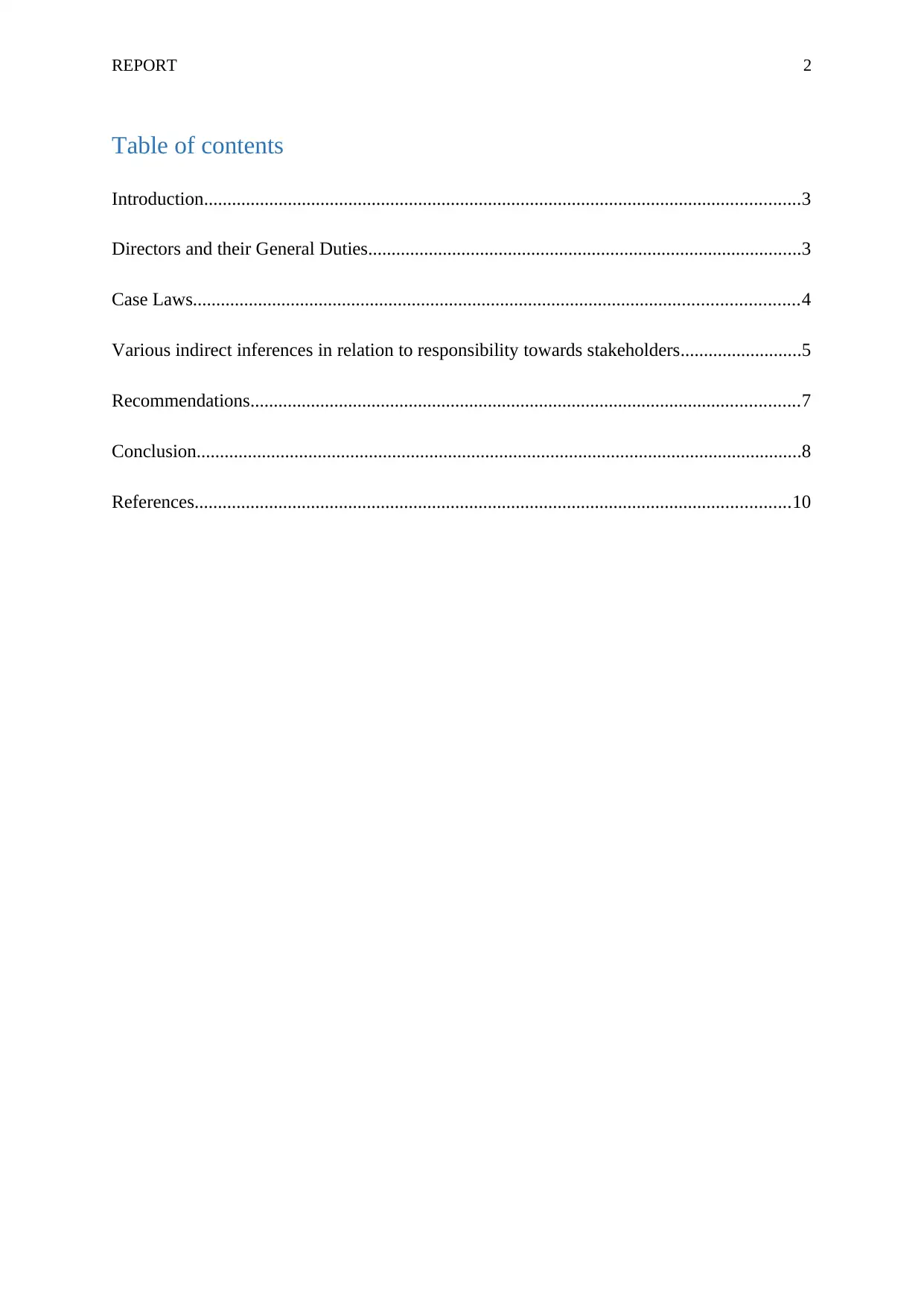
REPORT 2
Table of contents
Introduction................................................................................................................................3
Directors and their General Duties.............................................................................................3
Case Laws..................................................................................................................................4
Various indirect inferences in relation to responsibility towards stakeholders..........................5
Recommendations......................................................................................................................7
Conclusion..................................................................................................................................8
References................................................................................................................................10
Table of contents
Introduction................................................................................................................................3
Directors and their General Duties.............................................................................................3
Case Laws..................................................................................................................................4
Various indirect inferences in relation to responsibility towards stakeholders..........................5
Recommendations......................................................................................................................7
Conclusion..................................................................................................................................8
References................................................................................................................................10
⊘ This is a preview!⊘
Do you want full access?
Subscribe today to unlock all pages.

Trusted by 1+ million students worldwide
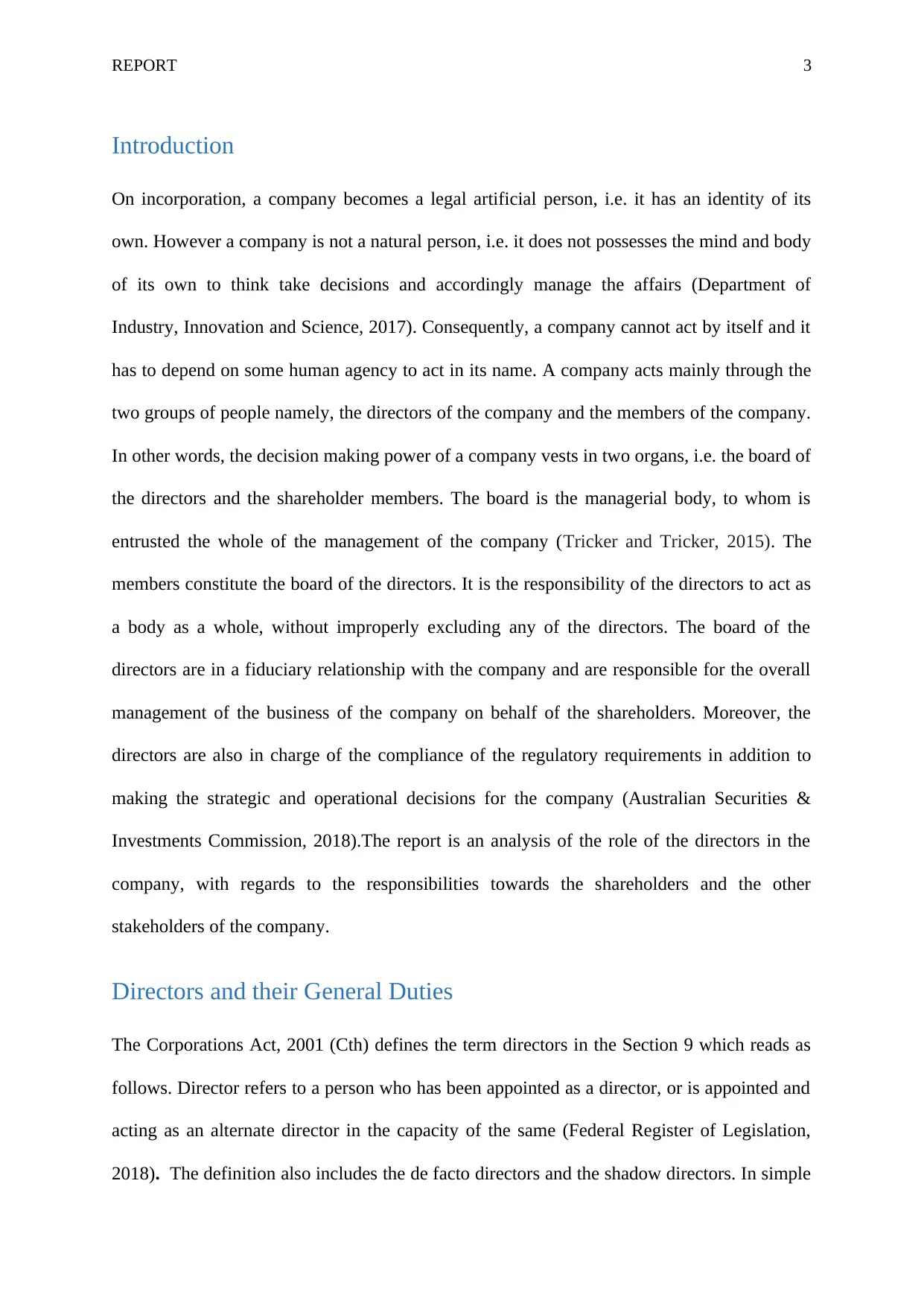
REPORT 3
Introduction
On incorporation, a company becomes a legal artificial person, i.e. it has an identity of its
own. However a company is not a natural person, i.e. it does not possesses the mind and body
of its own to think take decisions and accordingly manage the affairs (Department of
Industry, Innovation and Science, 2017). Consequently, a company cannot act by itself and it
has to depend on some human agency to act in its name. A company acts mainly through the
two groups of people namely, the directors of the company and the members of the company.
In other words, the decision making power of a company vests in two organs, i.e. the board of
the directors and the shareholder members. The board is the managerial body, to whom is
entrusted the whole of the management of the company (Tricker and Tricker, 2015). The
members constitute the board of the directors. It is the responsibility of the directors to act as
a body as a whole, without improperly excluding any of the directors. The board of the
directors are in a fiduciary relationship with the company and are responsible for the overall
management of the business of the company on behalf of the shareholders. Moreover, the
directors are also in charge of the compliance of the regulatory requirements in addition to
making the strategic and operational decisions for the company (Australian Securities &
Investments Commission, 2018).The report is an analysis of the role of the directors in the
company, with regards to the responsibilities towards the shareholders and the other
stakeholders of the company.
Directors and their General Duties
The Corporations Act, 2001 (Cth) defines the term directors in the Section 9 which reads as
follows. Director refers to a person who has been appointed as a director, or is appointed and
acting as an alternate director in the capacity of the same (Federal Register of Legislation,
2018). The definition also includes the de facto directors and the shadow directors. In simple
Introduction
On incorporation, a company becomes a legal artificial person, i.e. it has an identity of its
own. However a company is not a natural person, i.e. it does not possesses the mind and body
of its own to think take decisions and accordingly manage the affairs (Department of
Industry, Innovation and Science, 2017). Consequently, a company cannot act by itself and it
has to depend on some human agency to act in its name. A company acts mainly through the
two groups of people namely, the directors of the company and the members of the company.
In other words, the decision making power of a company vests in two organs, i.e. the board of
the directors and the shareholder members. The board is the managerial body, to whom is
entrusted the whole of the management of the company (Tricker and Tricker, 2015). The
members constitute the board of the directors. It is the responsibility of the directors to act as
a body as a whole, without improperly excluding any of the directors. The board of the
directors are in a fiduciary relationship with the company and are responsible for the overall
management of the business of the company on behalf of the shareholders. Moreover, the
directors are also in charge of the compliance of the regulatory requirements in addition to
making the strategic and operational decisions for the company (Australian Securities &
Investments Commission, 2018).The report is an analysis of the role of the directors in the
company, with regards to the responsibilities towards the shareholders and the other
stakeholders of the company.
Directors and their General Duties
The Corporations Act, 2001 (Cth) defines the term directors in the Section 9 which reads as
follows. Director refers to a person who has been appointed as a director, or is appointed and
acting as an alternate director in the capacity of the same (Federal Register of Legislation,
2018). The definition also includes the de facto directors and the shadow directors. In simple
Paraphrase This Document
Need a fresh take? Get an instant paraphrase of this document with our AI Paraphraser
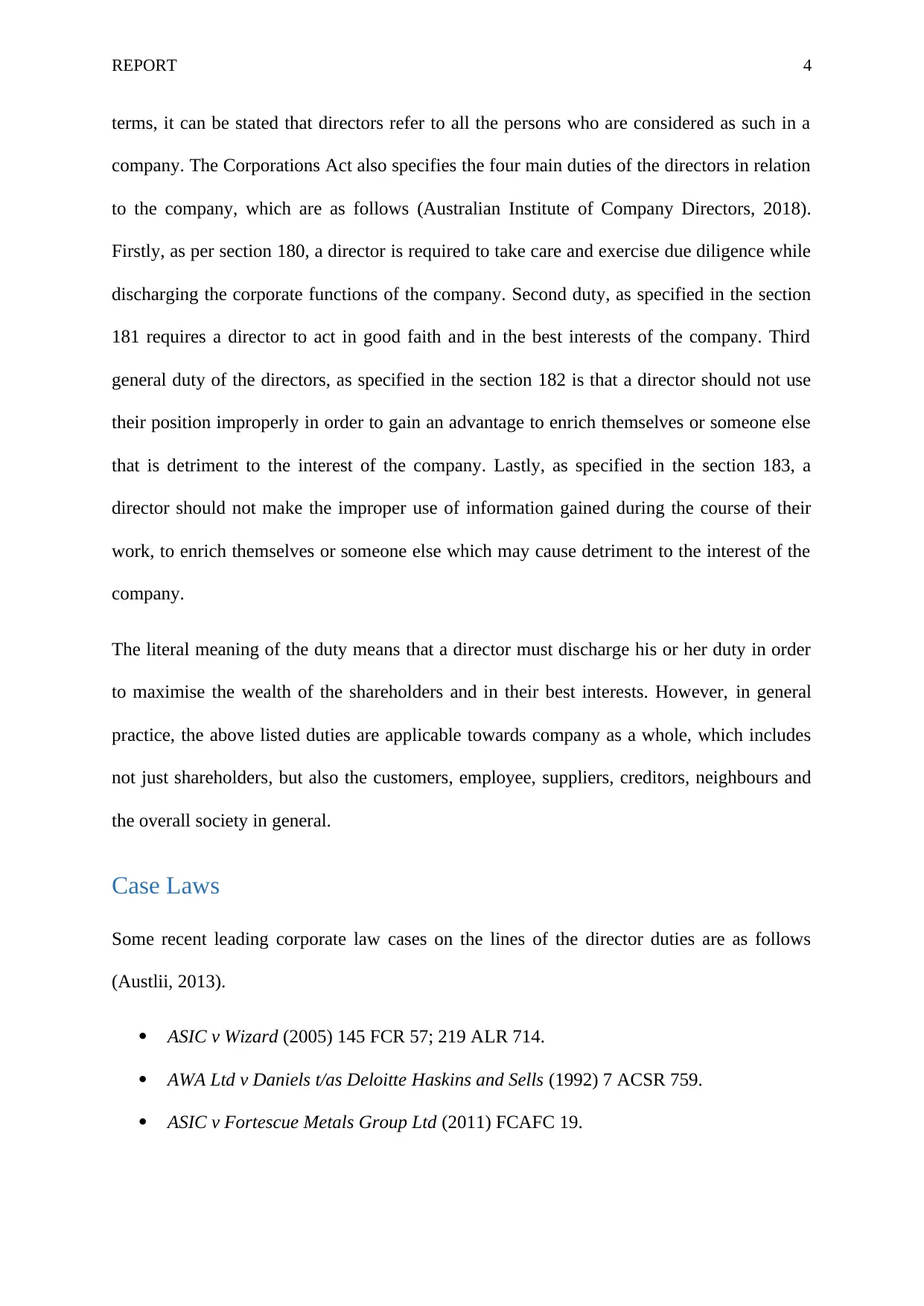
REPORT 4
terms, it can be stated that directors refer to all the persons who are considered as such in a
company. The Corporations Act also specifies the four main duties of the directors in relation
to the company, which are as follows (Australian Institute of Company Directors, 2018).
Firstly, as per section 180, a director is required to take care and exercise due diligence while
discharging the corporate functions of the company. Second duty, as specified in the section
181 requires a director to act in good faith and in the best interests of the company. Third
general duty of the directors, as specified in the section 182 is that a director should not use
their position improperly in order to gain an advantage to enrich themselves or someone else
that is detriment to the interest of the company. Lastly, as specified in the section 183, a
director should not make the improper use of information gained during the course of their
work, to enrich themselves or someone else which may cause detriment to the interest of the
company.
The literal meaning of the duty means that a director must discharge his or her duty in order
to maximise the wealth of the shareholders and in their best interests. However, in general
practice, the above listed duties are applicable towards company as a whole, which includes
not just shareholders, but also the customers, employee, suppliers, creditors, neighbours and
the overall society in general.
Case Laws
Some recent leading corporate law cases on the lines of the director duties are as follows
(Austlii, 2013).
ASIC v Wizard (2005) 145 FCR 57; 219 ALR 714.
AWA Ltd v Daniels t/as Deloitte Haskins and Sells (1992) 7 ACSR 759.
ASIC v Fortescue Metals Group Ltd (2011) FCAFC 19.
terms, it can be stated that directors refer to all the persons who are considered as such in a
company. The Corporations Act also specifies the four main duties of the directors in relation
to the company, which are as follows (Australian Institute of Company Directors, 2018).
Firstly, as per section 180, a director is required to take care and exercise due diligence while
discharging the corporate functions of the company. Second duty, as specified in the section
181 requires a director to act in good faith and in the best interests of the company. Third
general duty of the directors, as specified in the section 182 is that a director should not use
their position improperly in order to gain an advantage to enrich themselves or someone else
that is detriment to the interest of the company. Lastly, as specified in the section 183, a
director should not make the improper use of information gained during the course of their
work, to enrich themselves or someone else which may cause detriment to the interest of the
company.
The literal meaning of the duty means that a director must discharge his or her duty in order
to maximise the wealth of the shareholders and in their best interests. However, in general
practice, the above listed duties are applicable towards company as a whole, which includes
not just shareholders, but also the customers, employee, suppliers, creditors, neighbours and
the overall society in general.
Case Laws
Some recent leading corporate law cases on the lines of the director duties are as follows
(Austlii, 2013).
ASIC v Wizard (2005) 145 FCR 57; 219 ALR 714.
AWA Ltd v Daniels t/as Deloitte Haskins and Sells (1992) 7 ACSR 759.
ASIC v Fortescue Metals Group Ltd (2011) FCAFC 19.
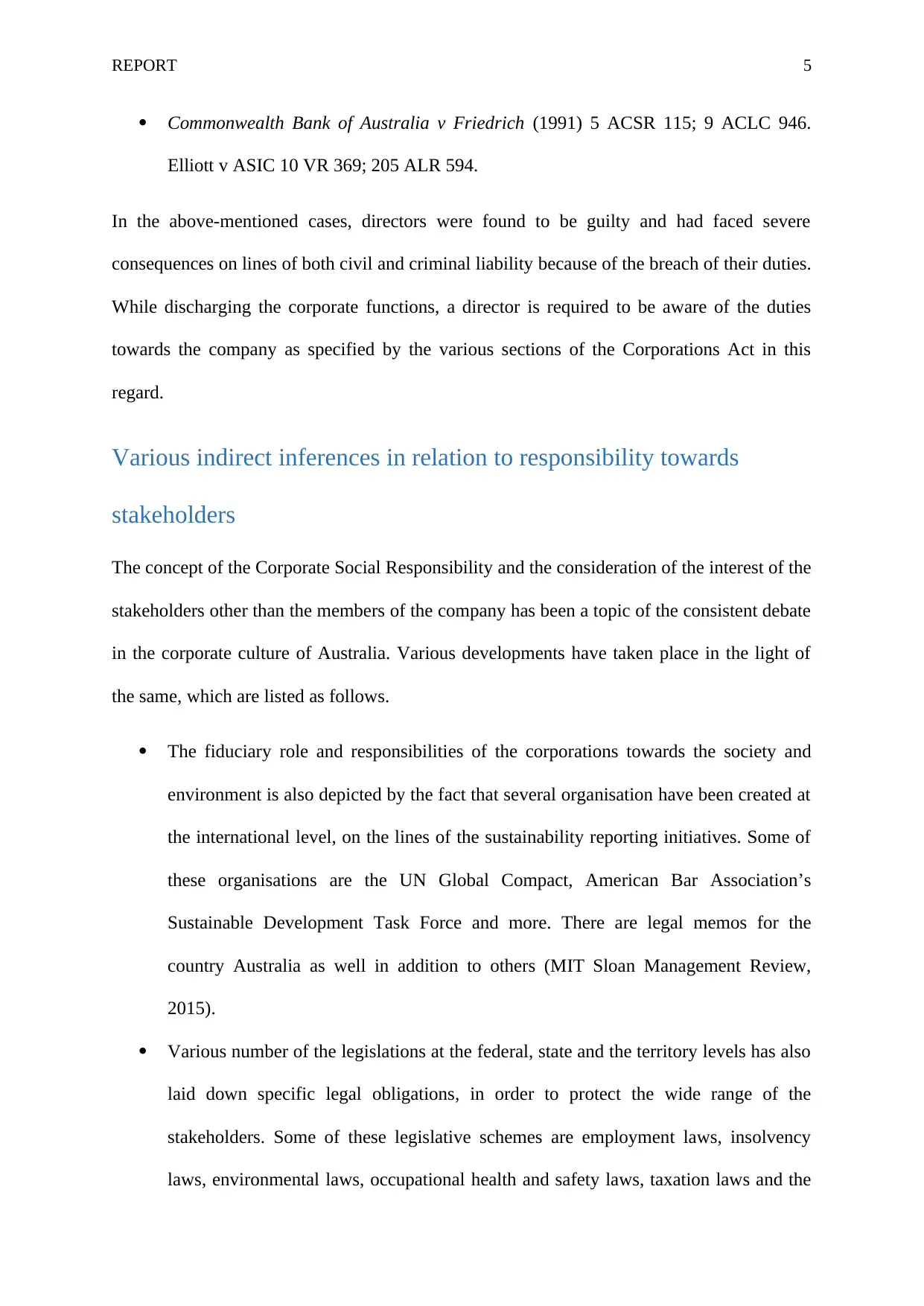
REPORT 5
Commonwealth Bank of Australia v Friedrich (1991) 5 ACSR 115; 9 ACLC 946.
Elliott v ASIC 10 VR 369; 205 ALR 594.
In the above-mentioned cases, directors were found to be guilty and had faced severe
consequences on lines of both civil and criminal liability because of the breach of their duties.
While discharging the corporate functions, a director is required to be aware of the duties
towards the company as specified by the various sections of the Corporations Act in this
regard.
Various indirect inferences in relation to responsibility towards
stakeholders
The concept of the Corporate Social Responsibility and the consideration of the interest of the
stakeholders other than the members of the company has been a topic of the consistent debate
in the corporate culture of Australia. Various developments have taken place in the light of
the same, which are listed as follows.
The fiduciary role and responsibilities of the corporations towards the society and
environment is also depicted by the fact that several organisation have been created at
the international level, on the lines of the sustainability reporting initiatives. Some of
these organisations are the UN Global Compact, American Bar Association’s
Sustainable Development Task Force and more. There are legal memos for the
country Australia as well in addition to others (MIT Sloan Management Review,
2015).
Various number of the legislations at the federal, state and the territory levels has also
laid down specific legal obligations, in order to protect the wide range of the
stakeholders. Some of these legislative schemes are employment laws, insolvency
laws, environmental laws, occupational health and safety laws, taxation laws and the
Commonwealth Bank of Australia v Friedrich (1991) 5 ACSR 115; 9 ACLC 946.
Elliott v ASIC 10 VR 369; 205 ALR 594.
In the above-mentioned cases, directors were found to be guilty and had faced severe
consequences on lines of both civil and criminal liability because of the breach of their duties.
While discharging the corporate functions, a director is required to be aware of the duties
towards the company as specified by the various sections of the Corporations Act in this
regard.
Various indirect inferences in relation to responsibility towards
stakeholders
The concept of the Corporate Social Responsibility and the consideration of the interest of the
stakeholders other than the members of the company has been a topic of the consistent debate
in the corporate culture of Australia. Various developments have taken place in the light of
the same, which are listed as follows.
The fiduciary role and responsibilities of the corporations towards the society and
environment is also depicted by the fact that several organisation have been created at
the international level, on the lines of the sustainability reporting initiatives. Some of
these organisations are the UN Global Compact, American Bar Association’s
Sustainable Development Task Force and more. There are legal memos for the
country Australia as well in addition to others (MIT Sloan Management Review,
2015).
Various number of the legislations at the federal, state and the territory levels has also
laid down specific legal obligations, in order to protect the wide range of the
stakeholders. Some of these legislative schemes are employment laws, insolvency
laws, environmental laws, occupational health and safety laws, taxation laws and the
⊘ This is a preview!⊘
Do you want full access?
Subscribe today to unlock all pages.

Trusted by 1+ million students worldwide
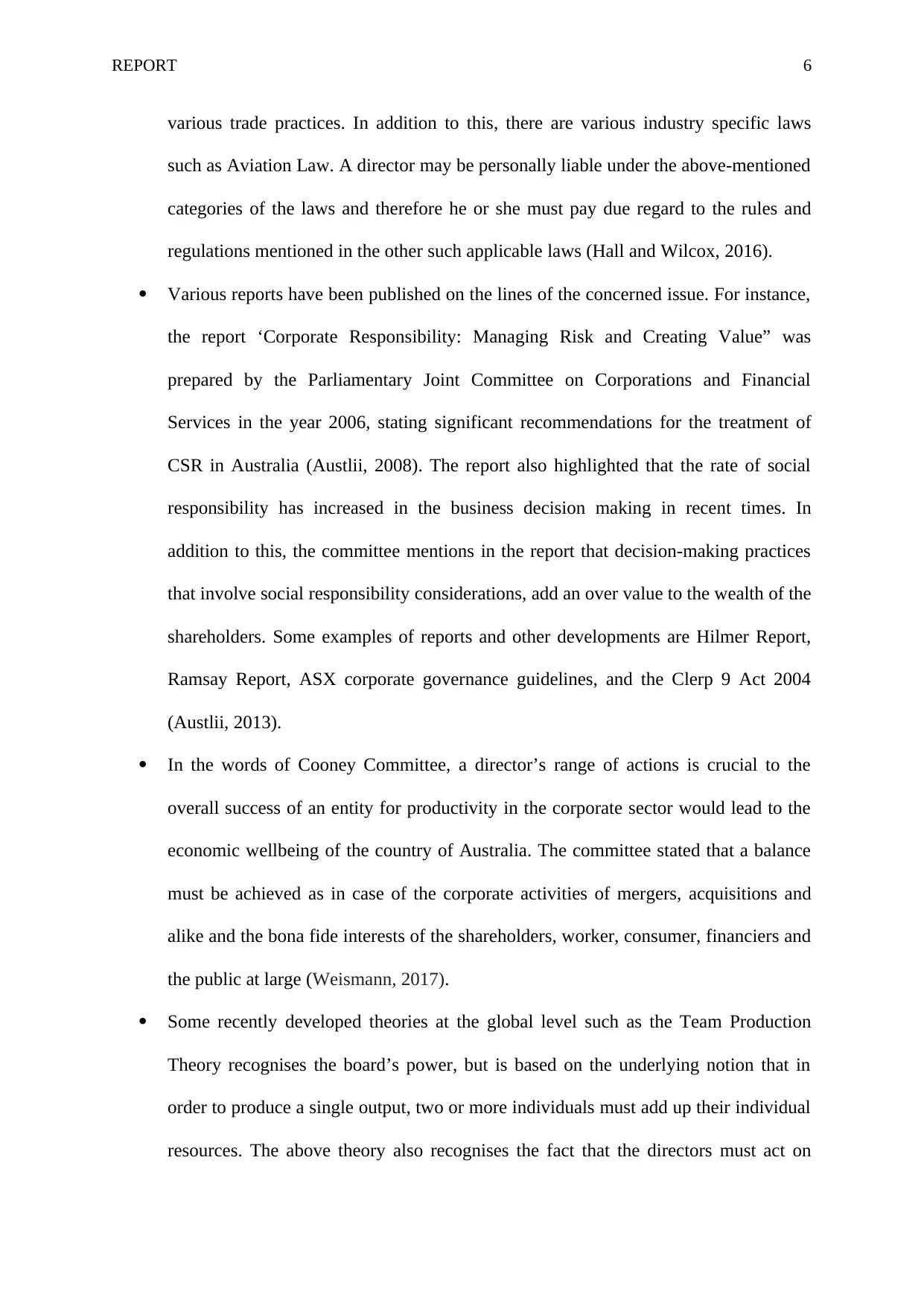
REPORT 6
various trade practices. In addition to this, there are various industry specific laws
such as Aviation Law. A director may be personally liable under the above-mentioned
categories of the laws and therefore he or she must pay due regard to the rules and
regulations mentioned in the other such applicable laws (Hall and Wilcox, 2016).
Various reports have been published on the lines of the concerned issue. For instance,
the report ‘Corporate Responsibility: Managing Risk and Creating Value” was
prepared by the Parliamentary Joint Committee on Corporations and Financial
Services in the year 2006, stating significant recommendations for the treatment of
CSR in Australia (Austlii, 2008). The report also highlighted that the rate of social
responsibility has increased in the business decision making in recent times. In
addition to this, the committee mentions in the report that decision-making practices
that involve social responsibility considerations, add an over value to the wealth of the
shareholders. Some examples of reports and other developments are Hilmer Report,
Ramsay Report, ASX corporate governance guidelines, and the Clerp 9 Act 2004
(Austlii, 2013).
In the words of Cooney Committee, a director’s range of actions is crucial to the
overall success of an entity for productivity in the corporate sector would lead to the
economic wellbeing of the country of Australia. The committee stated that a balance
must be achieved as in case of the corporate activities of mergers, acquisitions and
alike and the bona fide interests of the shareholders, worker, consumer, financiers and
the public at large (Weismann, 2017).
Some recently developed theories at the global level such as the Team Production
Theory recognises the board’s power, but is based on the underlying notion that in
order to produce a single output, two or more individuals must add up their individual
resources. The above theory also recognises the fact that the directors must act on
various trade practices. In addition to this, there are various industry specific laws
such as Aviation Law. A director may be personally liable under the above-mentioned
categories of the laws and therefore he or she must pay due regard to the rules and
regulations mentioned in the other such applicable laws (Hall and Wilcox, 2016).
Various reports have been published on the lines of the concerned issue. For instance,
the report ‘Corporate Responsibility: Managing Risk and Creating Value” was
prepared by the Parliamentary Joint Committee on Corporations and Financial
Services in the year 2006, stating significant recommendations for the treatment of
CSR in Australia (Austlii, 2008). The report also highlighted that the rate of social
responsibility has increased in the business decision making in recent times. In
addition to this, the committee mentions in the report that decision-making practices
that involve social responsibility considerations, add an over value to the wealth of the
shareholders. Some examples of reports and other developments are Hilmer Report,
Ramsay Report, ASX corporate governance guidelines, and the Clerp 9 Act 2004
(Austlii, 2013).
In the words of Cooney Committee, a director’s range of actions is crucial to the
overall success of an entity for productivity in the corporate sector would lead to the
economic wellbeing of the country of Australia. The committee stated that a balance
must be achieved as in case of the corporate activities of mergers, acquisitions and
alike and the bona fide interests of the shareholders, worker, consumer, financiers and
the public at large (Weismann, 2017).
Some recently developed theories at the global level such as the Team Production
Theory recognises the board’s power, but is based on the underlying notion that in
order to produce a single output, two or more individuals must add up their individual
resources. The above theory also recognises the fact that the directors must act on
Paraphrase This Document
Need a fresh take? Get an instant paraphrase of this document with our AI Paraphraser
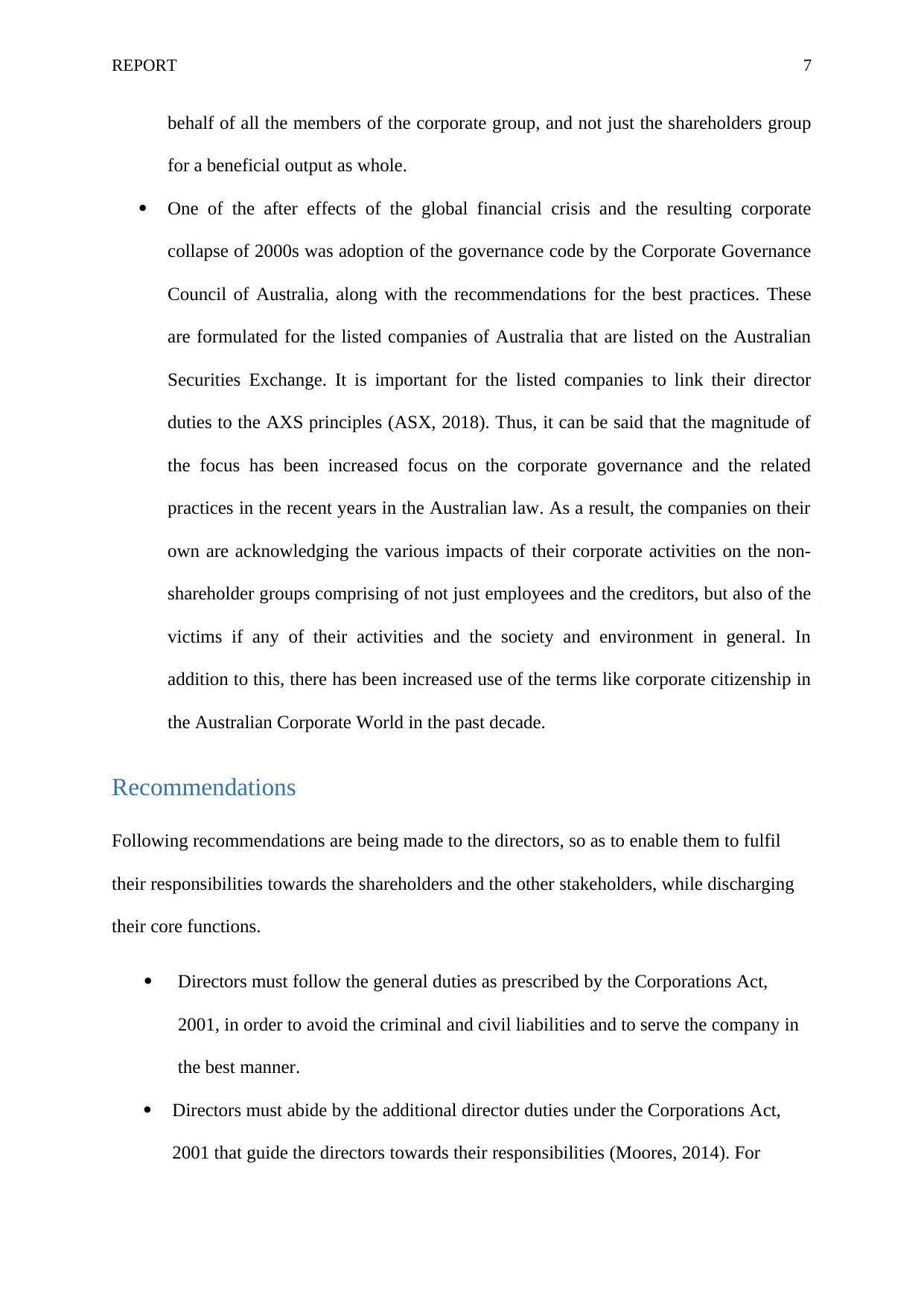
REPORT 7
behalf of all the members of the corporate group, and not just the shareholders group
for a beneficial output as whole.
One of the after effects of the global financial crisis and the resulting corporate
collapse of 2000s was adoption of the governance code by the Corporate Governance
Council of Australia, along with the recommendations for the best practices. These
are formulated for the listed companies of Australia that are listed on the Australian
Securities Exchange. It is important for the listed companies to link their director
duties to the AXS principles (ASX, 2018). Thus, it can be said that the magnitude of
the focus has been increased focus on the corporate governance and the related
practices in the recent years in the Australian law. As a result, the companies on their
own are acknowledging the various impacts of their corporate activities on the non-
shareholder groups comprising of not just employees and the creditors, but also of the
victims if any of their activities and the society and environment in general. In
addition to this, there has been increased use of the terms like corporate citizenship in
the Australian Corporate World in the past decade.
Recommendations
Following recommendations are being made to the directors, so as to enable them to fulfil
their responsibilities towards the shareholders and the other stakeholders, while discharging
their core functions.
Directors must follow the general duties as prescribed by the Corporations Act,
2001, in order to avoid the criminal and civil liabilities and to serve the company in
the best manner.
Directors must abide by the additional director duties under the Corporations Act,
2001 that guide the directors towards their responsibilities (Moores, 2014). For
behalf of all the members of the corporate group, and not just the shareholders group
for a beneficial output as whole.
One of the after effects of the global financial crisis and the resulting corporate
collapse of 2000s was adoption of the governance code by the Corporate Governance
Council of Australia, along with the recommendations for the best practices. These
are formulated for the listed companies of Australia that are listed on the Australian
Securities Exchange. It is important for the listed companies to link their director
duties to the AXS principles (ASX, 2018). Thus, it can be said that the magnitude of
the focus has been increased focus on the corporate governance and the related
practices in the recent years in the Australian law. As a result, the companies on their
own are acknowledging the various impacts of their corporate activities on the non-
shareholder groups comprising of not just employees and the creditors, but also of the
victims if any of their activities and the society and environment in general. In
addition to this, there has been increased use of the terms like corporate citizenship in
the Australian Corporate World in the past decade.
Recommendations
Following recommendations are being made to the directors, so as to enable them to fulfil
their responsibilities towards the shareholders and the other stakeholders, while discharging
their core functions.
Directors must follow the general duties as prescribed by the Corporations Act,
2001, in order to avoid the criminal and civil liabilities and to serve the company in
the best manner.
Directors must abide by the additional director duties under the Corporations Act,
2001 that guide the directors towards their responsibilities (Moores, 2014). For
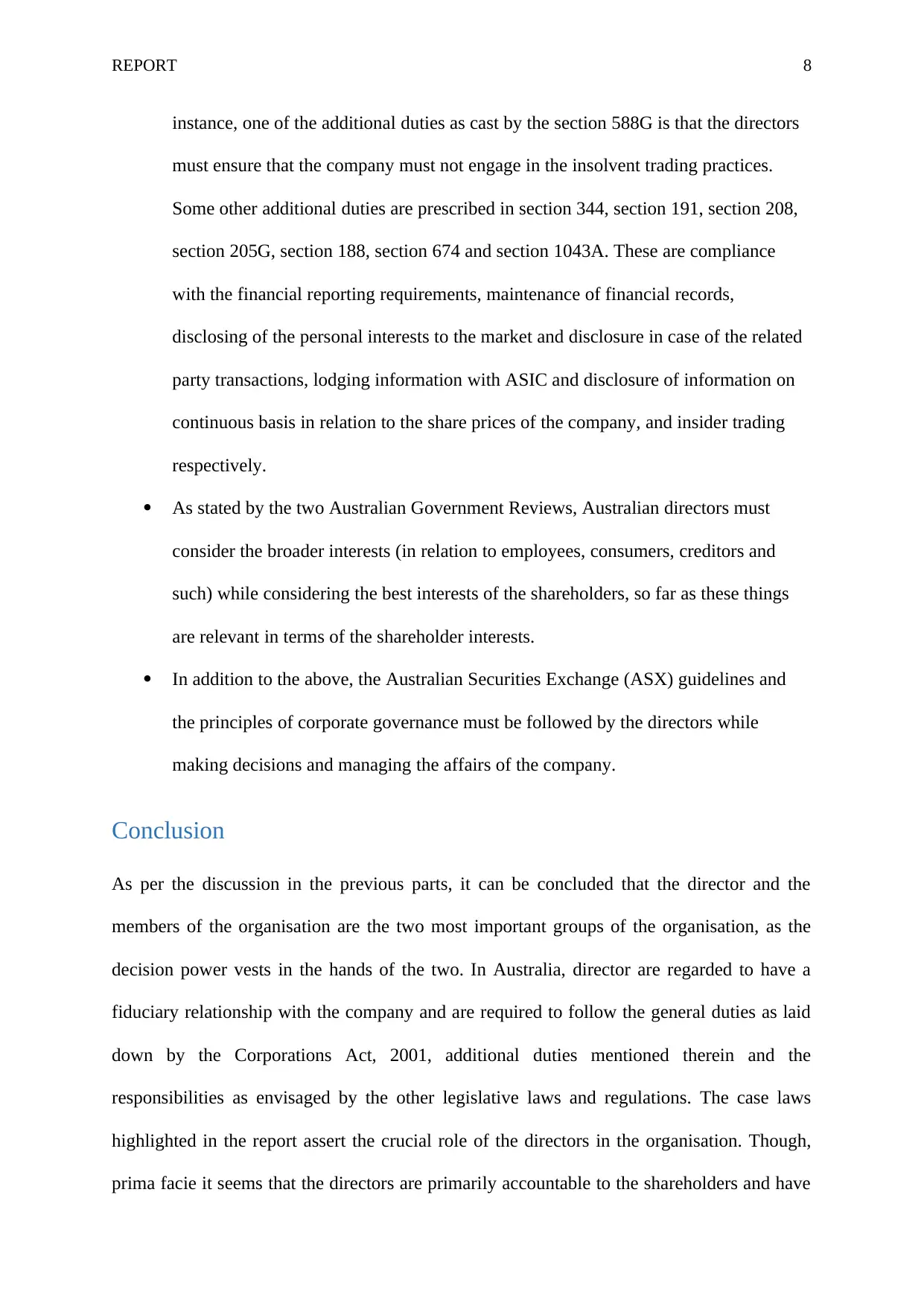
REPORT 8
instance, one of the additional duties as cast by the section 588G is that the directors
must ensure that the company must not engage in the insolvent trading practices.
Some other additional duties are prescribed in section 344, section 191, section 208,
section 205G, section 188, section 674 and section 1043A. These are compliance
with the financial reporting requirements, maintenance of financial records,
disclosing of the personal interests to the market and disclosure in case of the related
party transactions, lodging information with ASIC and disclosure of information on
continuous basis in relation to the share prices of the company, and insider trading
respectively.
As stated by the two Australian Government Reviews, Australian directors must
consider the broader interests (in relation to employees, consumers, creditors and
such) while considering the best interests of the shareholders, so far as these things
are relevant in terms of the shareholder interests.
In addition to the above, the Australian Securities Exchange (ASX) guidelines and
the principles of corporate governance must be followed by the directors while
making decisions and managing the affairs of the company.
Conclusion
As per the discussion in the previous parts, it can be concluded that the director and the
members of the organisation are the two most important groups of the organisation, as the
decision power vests in the hands of the two. In Australia, director are regarded to have a
fiduciary relationship with the company and are required to follow the general duties as laid
down by the Corporations Act, 2001, additional duties mentioned therein and the
responsibilities as envisaged by the other legislative laws and regulations. The case laws
highlighted in the report assert the crucial role of the directors in the organisation. Though,
prima facie it seems that the directors are primarily accountable to the shareholders and have
instance, one of the additional duties as cast by the section 588G is that the directors
must ensure that the company must not engage in the insolvent trading practices.
Some other additional duties are prescribed in section 344, section 191, section 208,
section 205G, section 188, section 674 and section 1043A. These are compliance
with the financial reporting requirements, maintenance of financial records,
disclosing of the personal interests to the market and disclosure in case of the related
party transactions, lodging information with ASIC and disclosure of information on
continuous basis in relation to the share prices of the company, and insider trading
respectively.
As stated by the two Australian Government Reviews, Australian directors must
consider the broader interests (in relation to employees, consumers, creditors and
such) while considering the best interests of the shareholders, so far as these things
are relevant in terms of the shareholder interests.
In addition to the above, the Australian Securities Exchange (ASX) guidelines and
the principles of corporate governance must be followed by the directors while
making decisions and managing the affairs of the company.
Conclusion
As per the discussion in the previous parts, it can be concluded that the director and the
members of the organisation are the two most important groups of the organisation, as the
decision power vests in the hands of the two. In Australia, director are regarded to have a
fiduciary relationship with the company and are required to follow the general duties as laid
down by the Corporations Act, 2001, additional duties mentioned therein and the
responsibilities as envisaged by the other legislative laws and regulations. The case laws
highlighted in the report assert the crucial role of the directors in the organisation. Though,
prima facie it seems that the directors are primarily accountable to the shareholders and have
⊘ This is a preview!⊘
Do you want full access?
Subscribe today to unlock all pages.

Trusted by 1+ million students worldwide
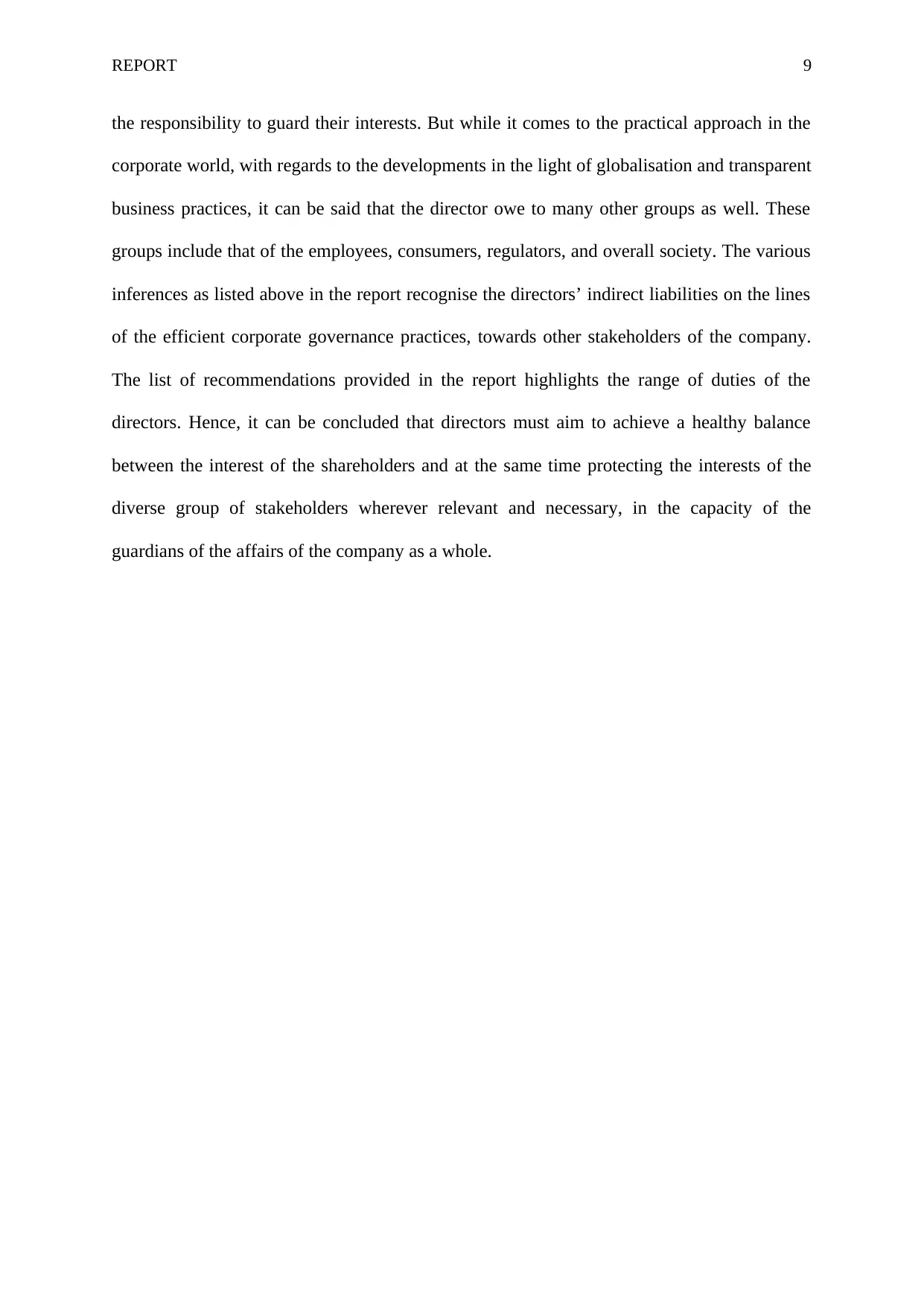
REPORT 9
the responsibility to guard their interests. But while it comes to the practical approach in the
corporate world, with regards to the developments in the light of globalisation and transparent
business practices, it can be said that the director owe to many other groups as well. These
groups include that of the employees, consumers, regulators, and overall society. The various
inferences as listed above in the report recognise the directors’ indirect liabilities on the lines
of the efficient corporate governance practices, towards other stakeholders of the company.
The list of recommendations provided in the report highlights the range of duties of the
directors. Hence, it can be concluded that directors must aim to achieve a healthy balance
between the interest of the shareholders and at the same time protecting the interests of the
diverse group of stakeholders wherever relevant and necessary, in the capacity of the
guardians of the affairs of the company as a whole.
the responsibility to guard their interests. But while it comes to the practical approach in the
corporate world, with regards to the developments in the light of globalisation and transparent
business practices, it can be said that the director owe to many other groups as well. These
groups include that of the employees, consumers, regulators, and overall society. The various
inferences as listed above in the report recognise the directors’ indirect liabilities on the lines
of the efficient corporate governance practices, towards other stakeholders of the company.
The list of recommendations provided in the report highlights the range of duties of the
directors. Hence, it can be concluded that directors must aim to achieve a healthy balance
between the interest of the shareholders and at the same time protecting the interests of the
diverse group of stakeholders wherever relevant and necessary, in the capacity of the
guardians of the affairs of the company as a whole.
Paraphrase This Document
Need a fresh take? Get an instant paraphrase of this document with our AI Paraphraser
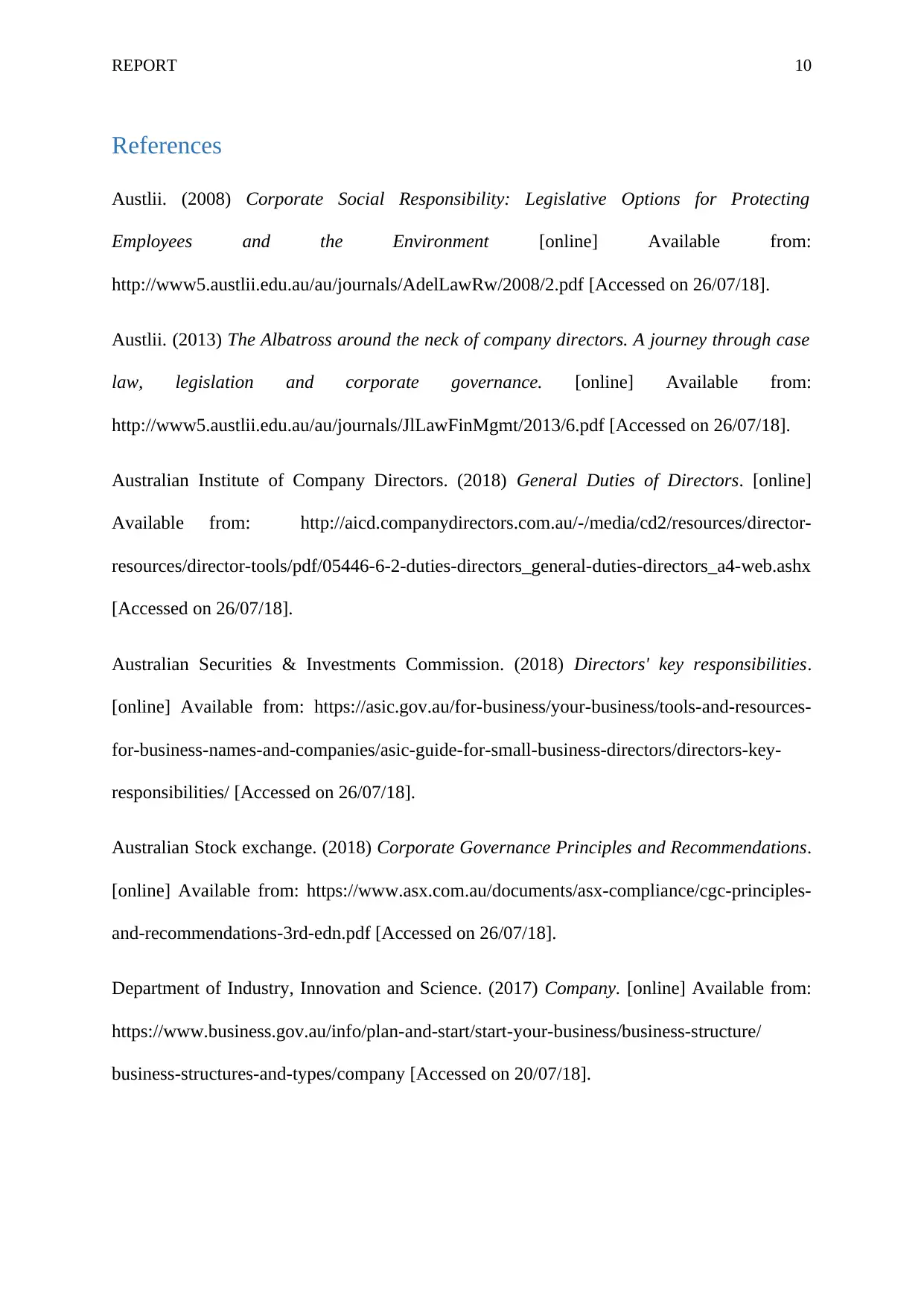
REPORT 10
References
Austlii. (2008) Corporate Social Responsibility: Legislative Options for Protecting
Employees and the Environment [online] Available from:
http://www5.austlii.edu.au/au/journals/AdelLawRw/2008/2.pdf [Accessed on 26/07/18].
Austlii. (2013) The Albatross around the neck of company directors. A journey through case
law, legislation and corporate governance. [online] Available from:
http://www5.austlii.edu.au/au/journals/JlLawFinMgmt/2013/6.pdf [Accessed on 26/07/18].
Australian Institute of Company Directors. (2018) General Duties of Directors. [online]
Available from: http://aicd.companydirectors.com.au/-/media/cd2/resources/director-
resources/director-tools/pdf/05446-6-2-duties-directors_general-duties-directors_a4-web.ashx
[Accessed on 26/07/18].
Australian Securities & Investments Commission. (2018) Directors' key responsibilities.
[online] Available from: https://asic.gov.au/for-business/your-business/tools-and-resources-
for-business-names-and-companies/asic-guide-for-small-business-directors/directors-key-
responsibilities/ [Accessed on 26/07/18].
Australian Stock exchange. (2018) Corporate Governance Principles and Recommendations.
[online] Available from: https://www.asx.com.au/documents/asx-compliance/cgc-principles-
and-recommendations-3rd-edn.pdf [Accessed on 26/07/18].
Department of Industry, Innovation and Science. (2017) Company. [online] Available from:
https://www.business.gov.au/info/plan-and-start/start-your-business/business-structure/
business-structures-and-types/company [Accessed on 20/07/18].
References
Austlii. (2008) Corporate Social Responsibility: Legislative Options for Protecting
Employees and the Environment [online] Available from:
http://www5.austlii.edu.au/au/journals/AdelLawRw/2008/2.pdf [Accessed on 26/07/18].
Austlii. (2013) The Albatross around the neck of company directors. A journey through case
law, legislation and corporate governance. [online] Available from:
http://www5.austlii.edu.au/au/journals/JlLawFinMgmt/2013/6.pdf [Accessed on 26/07/18].
Australian Institute of Company Directors. (2018) General Duties of Directors. [online]
Available from: http://aicd.companydirectors.com.au/-/media/cd2/resources/director-
resources/director-tools/pdf/05446-6-2-duties-directors_general-duties-directors_a4-web.ashx
[Accessed on 26/07/18].
Australian Securities & Investments Commission. (2018) Directors' key responsibilities.
[online] Available from: https://asic.gov.au/for-business/your-business/tools-and-resources-
for-business-names-and-companies/asic-guide-for-small-business-directors/directors-key-
responsibilities/ [Accessed on 26/07/18].
Australian Stock exchange. (2018) Corporate Governance Principles and Recommendations.
[online] Available from: https://www.asx.com.au/documents/asx-compliance/cgc-principles-
and-recommendations-3rd-edn.pdf [Accessed on 26/07/18].
Department of Industry, Innovation and Science. (2017) Company. [online] Available from:
https://www.business.gov.au/info/plan-and-start/start-your-business/business-structure/
business-structures-and-types/company [Accessed on 20/07/18].
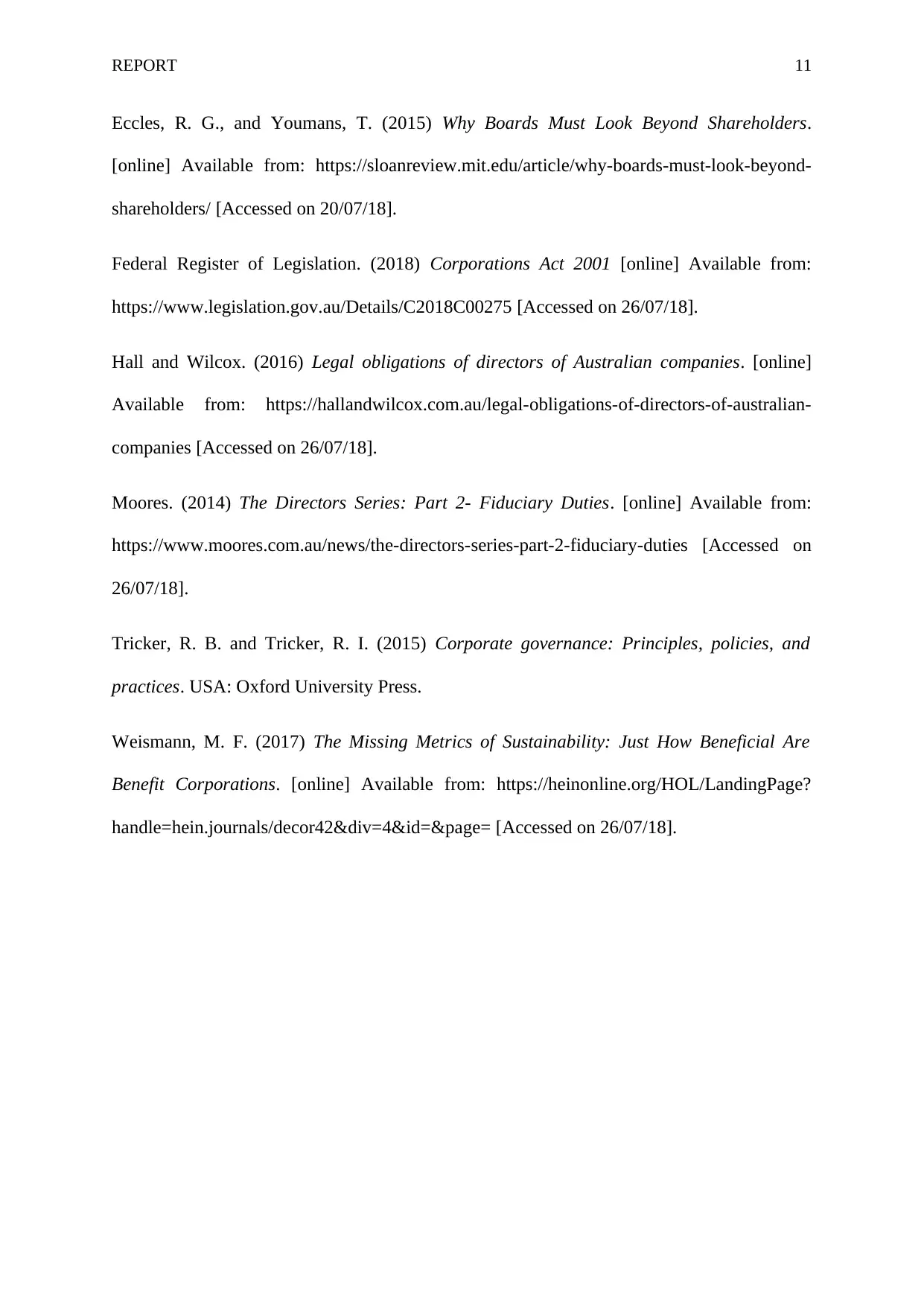
REPORT 11
Eccles, R. G., and Youmans, T. (2015) Why Boards Must Look Beyond Shareholders.
[online] Available from: https://sloanreview.mit.edu/article/why-boards-must-look-beyond-
shareholders/ [Accessed on 20/07/18].
Federal Register of Legislation. (2018) Corporations Act 2001 [online] Available from:
https://www.legislation.gov.au/Details/C2018C00275 [Accessed on 26/07/18].
Hall and Wilcox. (2016) Legal obligations of directors of Australian companies. [online]
Available from: https://hallandwilcox.com.au/legal-obligations-of-directors-of-australian-
companies [Accessed on 26/07/18].
Moores. (2014) The Directors Series: Part 2- Fiduciary Duties. [online] Available from:
https://www.moores.com.au/news/the-directors-series-part-2-fiduciary-duties [Accessed on
26/07/18].
Tricker, R. B. and Tricker, R. I. (2015) Corporate governance: Principles, policies, and
practices. USA: Oxford University Press.
Weismann, M. F. (2017) The Missing Metrics of Sustainability: Just How Beneficial Are
Benefit Corporations. [online] Available from: https://heinonline.org/HOL/LandingPage?
handle=hein.journals/decor42&div=4&id=&page= [Accessed on 26/07/18].
Eccles, R. G., and Youmans, T. (2015) Why Boards Must Look Beyond Shareholders.
[online] Available from: https://sloanreview.mit.edu/article/why-boards-must-look-beyond-
shareholders/ [Accessed on 20/07/18].
Federal Register of Legislation. (2018) Corporations Act 2001 [online] Available from:
https://www.legislation.gov.au/Details/C2018C00275 [Accessed on 26/07/18].
Hall and Wilcox. (2016) Legal obligations of directors of Australian companies. [online]
Available from: https://hallandwilcox.com.au/legal-obligations-of-directors-of-australian-
companies [Accessed on 26/07/18].
Moores. (2014) The Directors Series: Part 2- Fiduciary Duties. [online] Available from:
https://www.moores.com.au/news/the-directors-series-part-2-fiduciary-duties [Accessed on
26/07/18].
Tricker, R. B. and Tricker, R. I. (2015) Corporate governance: Principles, policies, and
practices. USA: Oxford University Press.
Weismann, M. F. (2017) The Missing Metrics of Sustainability: Just How Beneficial Are
Benefit Corporations. [online] Available from: https://heinonline.org/HOL/LandingPage?
handle=hein.journals/decor42&div=4&id=&page= [Accessed on 26/07/18].
⊘ This is a preview!⊘
Do you want full access?
Subscribe today to unlock all pages.

Trusted by 1+ million students worldwide
1 out of 12
Related Documents
Your All-in-One AI-Powered Toolkit for Academic Success.
+13062052269
info@desklib.com
Available 24*7 on WhatsApp / Email
![[object Object]](/_next/static/media/star-bottom.7253800d.svg)
Unlock your academic potential
Copyright © 2020–2026 A2Z Services. All Rights Reserved. Developed and managed by ZUCOL.




